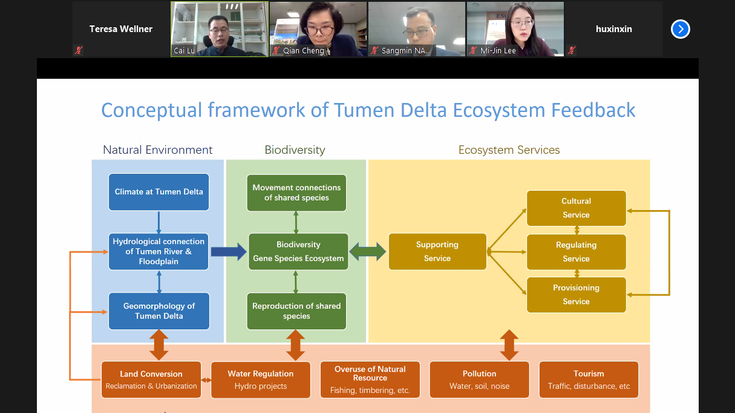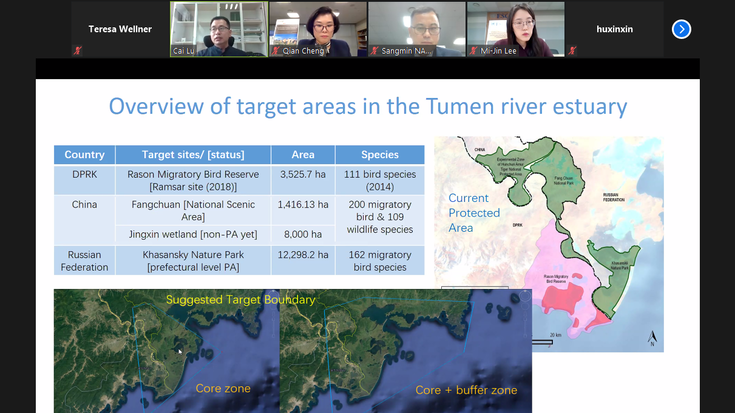Expert Meeting
Transboundary Cooperation and the Tumen River Delta

On May 15th Dr. Bernhard Seliger and Felix Glenk took part in the Expert Group Meeting organized by UNESCAP, talking about transboundary cooperation among wetlands in the Tumen River Estuary. During the meeting, experts from China, Russia and South Korea were present and the representatives of the Hanns Seidel Foundation took part to share their knowledge on the area in North Korea. The meeting was held online and in his opening words, Ganbold Baasanjav, Head of the Subregional Office for East and North-East Asia of UNESCAP praised the involved parties for their diligence and dedication to the program even in these difficult times.
Tumen River – a cultural and environmental paradise
The Tumen River Estuary is not only home to a vast variety of wildlife, including many species of fish, birds and even tigers and leopards, but also a unique chance for international collaboration, as it is a boundary river between three countries – China, Russia and North Korea. UNESCAP has made it its goal to support the protection of the wetlands located there and ensure the great biodiversity is being preserved, which is only made possible through international cooperation between all parties. This kind of transboundary program has immense cultural value as it is one of its kind.
One of the core regions the program is set to protect is the Rason Migratory Bird Reserve in North Korea, which the HSF visited and studied for a long time and thus served as an expert for in the international online meeting. The goal of the meeting was to refine the UNESCAPs report on the current situation in Tumen River Wetlands as well as outline key challenges and recommendations.

Hanns Seidel Foundation Contributes Data Collection
Dr. Bernhard Seliger prepared a short presentation about the work of the Hanns Seidel Foundation considering the wetland areas and their key findings. Since 2014 there had been a number of surveys and studies on biodiversity during which the list of species that were seen in the area has been doubled.
Rason is now registered as a Ramsar site, ensuring environmentally conscious use of the area and protection of its biodiversity, and North Korean researchers are active there, which makes for a possibility of future collaboration between Russian, Chinese, and North Korean stakeholders. A transboundary study trip as well as a swan festival had been planned for 2020 but have both been delayed due to COVID-19.
Dr. Seliger also brought up the threats that are currently being posed on a part of the wetlands in the Tumen River Estuary. Due to ongoing aquaculture in the area 10-15% of the land has been degraded, which could also have negative effects on water quality and thus wildlife. Minimizing the damage and protecting the biodiversity is an important task here.
Professor Lu Cai from Beijing Forest University named the HSF for their expertise in the area and their extensive collection of data, which provides a solid scientific base for reports about the area and makes further research possible.
Swan Festivals and Transboundary Communication
There are many challenges that need to be overcome in order to protect the wetlands of Tumen River – the biggest being coordinating a shared project between three different countries. On a local level there is the challenge of insufficient funding and staff in the area, such as a deficiency in regular monitoring and conservation activities, and a lack of local awareness for the environmental and cultural importance of wetlands.
On the national and international level there is the difficulty of coordinating the trilateral communication between Russia, China and the North Korea and keeping a constant exchange of information between parties. Especially communication with the latter is a complex task.
Joint research with a scientific basis, collaboration, and cultural exchange should be the main goals going forward in planning. Also, supporting mechanisms like communication and coordination channels need to be developed to strengthen transboundary communication between stakeholders.
Dr. Seliger proposed the thought of expanding on the idea of swan festivals in different locations, as swans are easy to spot birds and could attract tourists and festivals like these could serve as a unifying overall project in the different countries bordering the Tumen River.
What next?
An outlook to future steps showed that the Ramsar COP14 2021 in Wuhan, China, is a great opportunity for stakeholders to meet in a side event and plan forward. Additionally, international conferences, for instance under the Ramsar Convention, would be suitable as a host event for a trilateral meeting.
